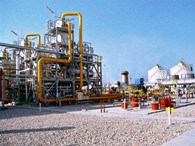 Anil Ambani group on Monday said the oil ministry's interference in marketing and pricing dampened investor interest in India's auction of oil and gas blocks and its chairman had warned the Prime Minister about the same.
Anil Ambani group on Monday said the oil ministry's interference in marketing and pricing dampened investor interest in India's auction of oil and gas blocks and its chairman had warned the Prime Minister about the same.
"Petroleum Ministry's open interference by curtailing marketing and pricing freedom is the single biggest reason for lack of international investor interest," an ADAG spokesperson said, quoting from a letter Anil Ambani had written to Prime Minister Manmohan Singh on October 9.
The auction ended on Monday with only 36 of the 70 blocks on offer receiving bids. Upstream regulator Director General of Hydrocarbons V K Sibal earlier attributed the poor response to the ongoing Ambani gas battle.
However, ADAG said Anil Ambani had forewarned that poor response, if at all, would be due to changes in the Production Sharing Contract by the Petroleum Ministry and not because of the dispute between RIL and RNRL.
"Contrary to PSC provisions requiring government to determine the valuation price for determining its take, royalty, etc, the oil ministry now says that the government has the right to decide the selling price of natural gas," the spokesperson added.
ADAG claimed that global energy majors were concerned about the Petroleum Ministry's recent actions on the gas pricing front, as this virtually amounts to "backdoor nationalisation" of the pricing and utilisation mechanism under NELP.
The ADAG spokesperson said Anil had rightly predicted the response of NELP-VIII. "The oil ministry either whittled down or simply withdrawn many of the key pricing and marketing rights originally granted to the contractor," an ADAG statement said.
BHP Biliton of Australia, BG of UK and Cairn Energy were the only notable foreign companies that joined the bid, besides home grown giants like ONGC.
Mukesh Ambani-led RIL did not put in any bid for oil and gas blocks, although it showed interest in one Coal Bed Methane block that is on auction separately.
ADAG argued that the Petroleum & Natural Gas Regulatory Board (PNGRB) Act of 2006 keeps the petroleum regulator out of the domain of gas pricing, resulting in a virtual carte blanche for private monopolistic player like Reliance Industries.
It sought amendment of the Act, stating that leaving "this important task in the hands of the administrative ministry runs the risk of avoidable controversies and, worse, compromising executive neutrality in the minds of stakeholders.
"The stand taken by the Petroleum Ministry affects not just the success of a particular policy initiative; it undermines the very foundations of the economic reforms process."





